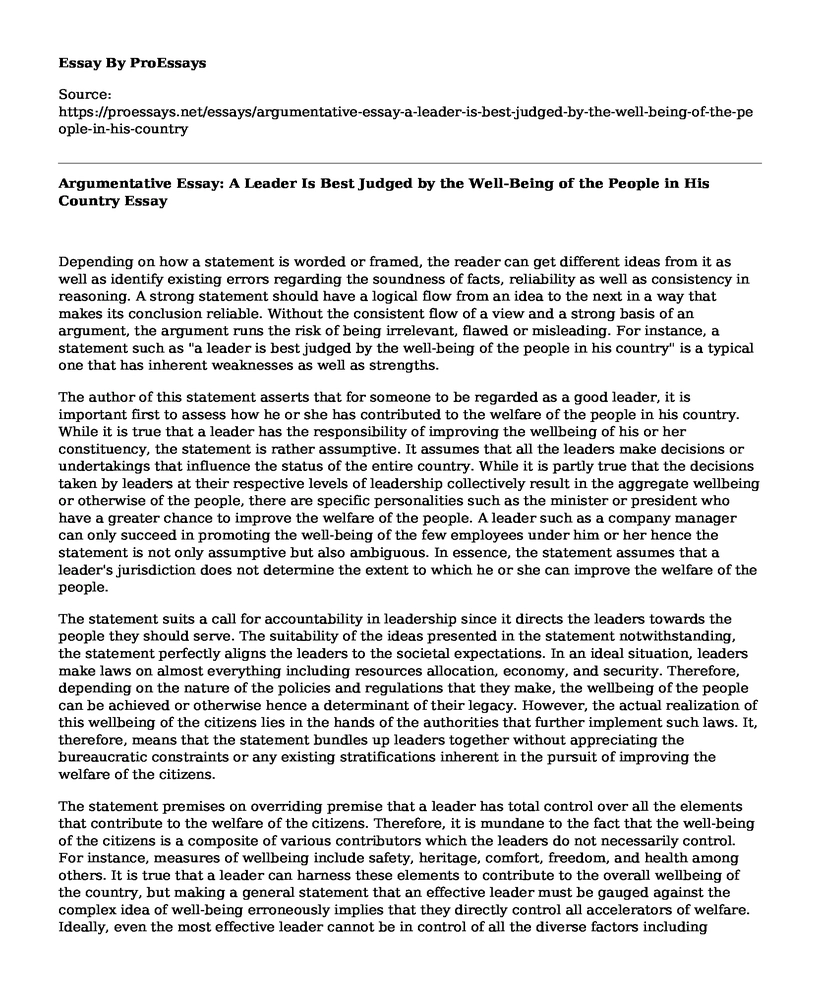Depending on how a statement is worded or framed, the reader can get different ideas from it as well as identify existing errors regarding the soundness of facts, reliability as well as consistency in reasoning. A strong statement should have a logical flow from an idea to the next in a way that makes its conclusion reliable. Without the consistent flow of a view and a strong basis of an argument, the argument runs the risk of being irrelevant, flawed or misleading. For instance, a statement such as "a leader is best judged by the well-being of the people in his country" is a typical one that has inherent weaknesses as well as strengths.
The author of this statement asserts that for someone to be regarded as a good leader, it is important first to assess how he or she has contributed to the welfare of the people in his country. While it is true that a leader has the responsibility of improving the wellbeing of his or her constituency, the statement is rather assumptive. It assumes that all the leaders make decisions or undertakings that influence the status of the entire country. While it is partly true that the decisions taken by leaders at their respective levels of leadership collectively result in the aggregate wellbeing or otherwise of the people, there are specific personalities such as the minister or president who have a greater chance to improve the welfare of the people. A leader such as a company manager can only succeed in promoting the well-being of the few employees under him or her hence the statement is not only assumptive but also ambiguous. In essence, the statement assumes that a leader's jurisdiction does not determine the extent to which he or she can improve the welfare of the people.
The statement suits a call for accountability in leadership since it directs the leaders towards the people they should serve. The suitability of the ideas presented in the statement notwithstanding, the statement perfectly aligns the leaders to the societal expectations. In an ideal situation, leaders make laws on almost everything including resources allocation, economy, and security. Therefore, depending on the nature of the policies and regulations that they make, the wellbeing of the people can be achieved or otherwise hence a determinant of their legacy. However, the actual realization of this wellbeing of the citizens lies in the hands of the authorities that further implement such laws. It, therefore, means that the statement bundles up leaders together without appreciating the bureaucratic constraints or any existing stratifications inherent in the pursuit of improving the welfare of the citizens.
The statement premises on overriding premise that a leader has total control over all the elements that contribute to the welfare of the citizens. Therefore, it is mundane to the fact that the well-being of the citizens is a composite of various contributors which the leaders do not necessarily control. For instance, measures of wellbeing include safety, heritage, comfort, freedom, and health among others. It is true that a leader can harness these elements to contribute to the overall wellbeing of the country, but making a general statement that an effective leader must be gauged against the complex idea of well-being erroneously implies that they directly control all accelerators of welfare. Ideally, even the most effective leader cannot be in control of all the diverse factors including natural attrition that also contribute to the overall welfare of the citizens.
Conclusion
In conclusion, the statement presents facts about leadership and responsibility in administration, but then it misses consistency in presenting them thus creating a sense of ambiguity. Generally, leaders have a link with the various avenues of producing the desired well-being of the people but cannot account for every single factor that yields it. In essence, making a statement to the effect that a leader must be judged based on the welfare of the citizens assumes that correlation between the leaders and factors contributing to well-being means they can cause improved welfare of the people.
Cite this page
Argumentative Essay: A Leader Is Best Judged by the Well-Being of the People in His Country. (2022, Aug 15). Retrieved from https://proessays.net/essays/argumentative-essay-a-leader-is-best-judged-by-the-well-being-of-the-people-in-his-country
If you are the original author of this essay and no longer wish to have it published on the ProEssays website, please click below to request its removal:
- The Relationship Between Empowering Leadership and Intention to Share Knowledge in the Context of NGOs
- An Outline of the Individual and Examples of their Leadership Behavior
- Employees and Organizational Change Paper Example
- Essay Sample on Globalization: Benefits, Impacts and Challenges
- Cultural Policies: Supporting and Protecting Art and Creativity - Essay Sample
- Essay Example on SpaceX's Strategies for Success: Public-Private Partnerships
- Essay Exampe on British Airways: A Model of HRM Strategies & Growth







